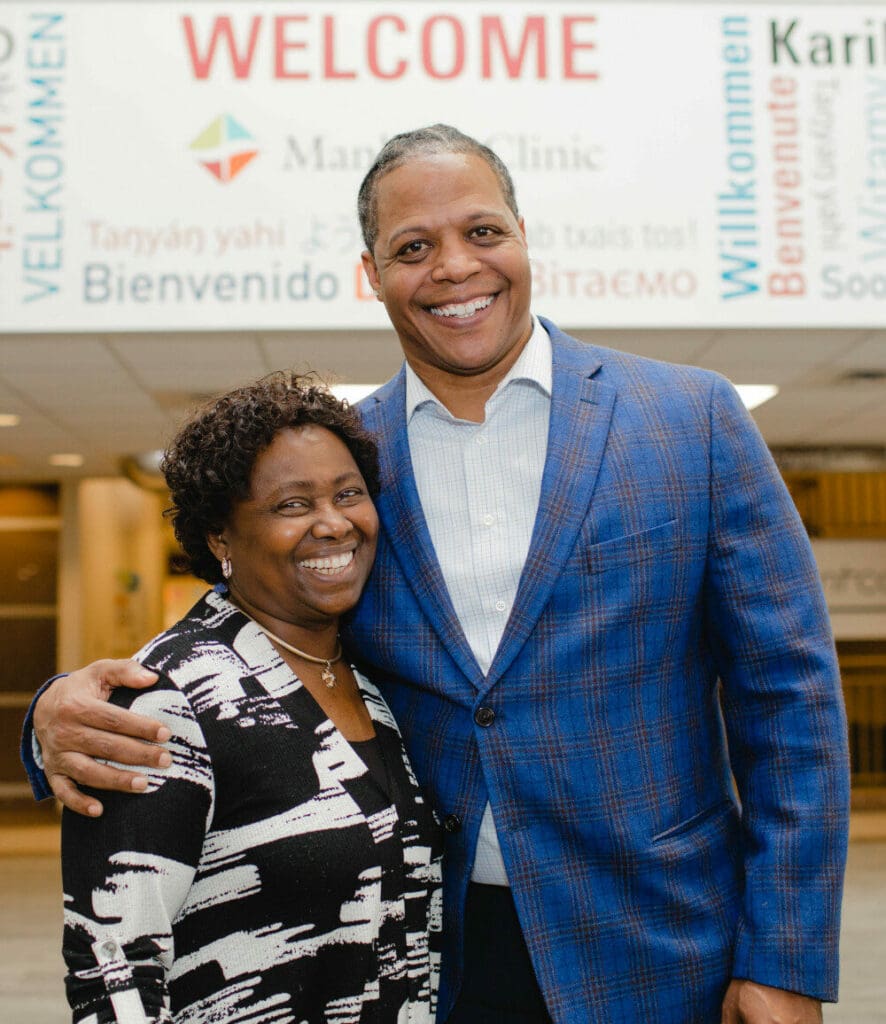Racism Is a Public Health Crisis

Bukata Hayes takes on health equity
Bukata Hayes of Mankato knows the score. As a Black man, he has a lower life expectancy than white men. African Americans are at a higher risk for heart diseases, cancer and diabetes. Health statistics like these are common across BIPOC (Black, Indigenous and People of Color) communities.
“Addressing racism as a public health crisis means we have to so some courageous and bold work,” Bukata said.
Since March 2021, Bukata Hayes has been vice president of racial and health equity at Blue Cross and Blue Shield of Minnesota. The largest non-profit health insurance plan in the state is leading the way in racial and health equity and Bukata is steering the effort.
As executive director of Greater Mankato Diversity Council for 15 years, Bukata helped make our region a more inclusive and equitable place for people of color and LGBTQA+.
Promoting racial and health equity is about opening up access to health care, removing barriers and having culturally concordant care that will create better health outcomes. “You can’t do that without addressing large scale systemic issues that impede folks to have access to that continuum of care.”
While Minnesota is one of the healthiest states in the nation, our state has some of the greatest health disparities between whites and people of color and American Indians.
Data on healthcare inequities and gaps in care are widespread. Nationally, Black women are three times more likely to die from a pregnancy-related cause than white women according to the Centers for Disease Control and Prevention. Black infant mortality rates – deaths within the first year of life – are nearly three times that of white infants.
“That’s actually people experiencing those gaps and inequities,” Bukata said.
Why is this happening? Variations in quality healthcare, underlying chronic conditions and structural racism are some factors. Social determinants of health – poverty, education, access to care, zip code – prevent many people from racial and ethnic minority groups from having fair opportunities for economic, physical and emotional health.
Solutions
Blue Cross is making a multi-million dollar investment to end health disparities in Minnesota. Having lived in Mankato for 30 years, Bukata understands the needs of Greater Minnesota.
Blue Cross is taking a two-prong approach. First, they are seeking community-led solutions and raising the voice of the people and communities experiencing inequities. Second, Blue Cross is addressing the issue from within by looking to Bukata to apply a racial and health equity lens to every aspect of its work and culture. A special focus is being placed on enhancing health plans to address specific needs of BIPOC members and communities more effectively.
To that end, Blue Cross is piloting programs to reimburse community health workers for services and help establish community health worker hubs statewide. Community health workers meet with patients one-on-one to bridge the gap between healthcare providers, insurance, social services, cultures and languages. Community health workers often come from the communities they serve.
In fact, Mankato Clinic, Blue Cross and WellShare International have partnered to establish a community health worker hub in downtown Mankato.
Community health workers help connect patients to resources for housing, food, insurance, income, employment, transportation. Then community health workers can help patients and families get the care they need. Vital health care includes vaccinations, check-ups, mammograms, prenatal care, and managing chronic conditions such as diabetes or asthma.
“We believe community health workers can and should be a critical part of connecting more equitable and accessible health care to communities who have been marginalized in the past,” Bukata said.
Learn more about community health workers in Mankato.
Dr. Baerg reminds Bukata to schedule health screenings becasue African Americans are at a higher risk for prostate and colon caners, diabetes and heart diseases.

Primary care physicians make a difference
Bukata Hayes has a trusting relationship with Dr. Caroline Baerg, his primary care physician. Always happy to see each other, Dr. Baerg asks Bukata questions about his wife, children and health. She truly cares.
“I feel heard. I feel valued. I feel listened to. I feel safe when I go into this space. We are not 100 percent the same, but we have some similarities, some connection points,” Bukata said.
At 47, Bukata nods in agreement when Dr. Baerg tells him to schedule a check-up. She explains it’s time to be screened for prostate cancer, colon cancer, diabetes and cholesterol. Dr. Baerg reminds him that African Americans are at a higher risk for prostate and colon cancers, diabetes and heart diseases. Bukata knows that his numbers and data are an important part of his healthcare journey.
Racial concordance is one reason Bukata chose Dr. Baerg to be his primary care physician. Concordance in a patient-physician relationship refers to a similarity or shared identity between physician and patient based on race, sex or age.
“We didn’t have many, if any, Black doctors in our community. I wanted the experience of having a Black doctor,” Bukata explained. “She’s helped us as she knows our family. She understands our medical history. Those relationships matter in fostering better health with myself and my family.”
Since it’s not feasible for everyone to see providers of the same race or ethnicity, Mankato Clinic, and healthcare organizations nationwide, offer cultural training to providers and staff. The training shines a light on biases and behaviors and promotes change. The Mankato Clinic Diversity, Equity and Inclusion Committee is also working to increase diversity among providers and staff.
As Bukata’s primary care physician for more than 10 years, Dr. Baerg has watched him succeed.
“He became a resilient, persistent young man who has refused to break. He never quits making sure that people are represented well,” Dr. Baerg said. “I also admire the place he is as a husband and father. He has a strong family.”